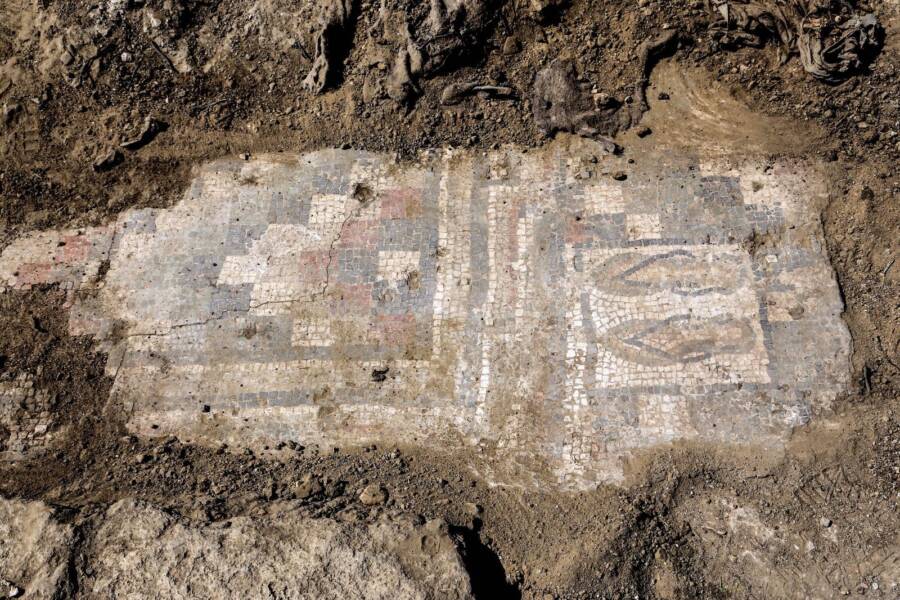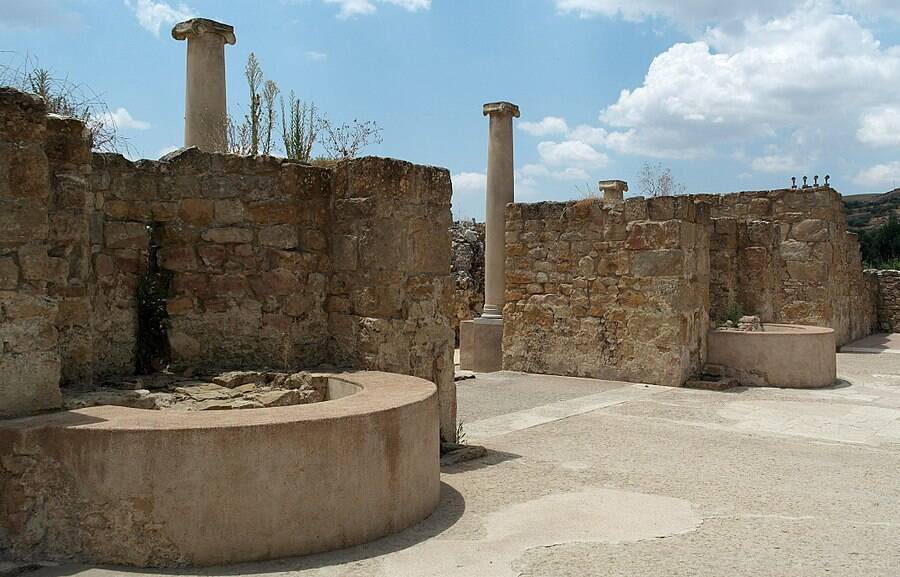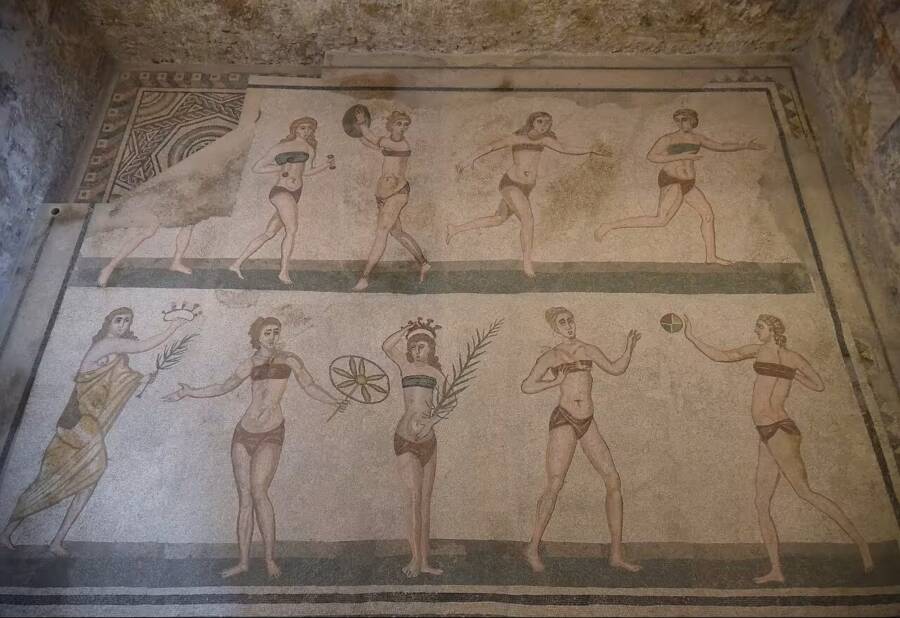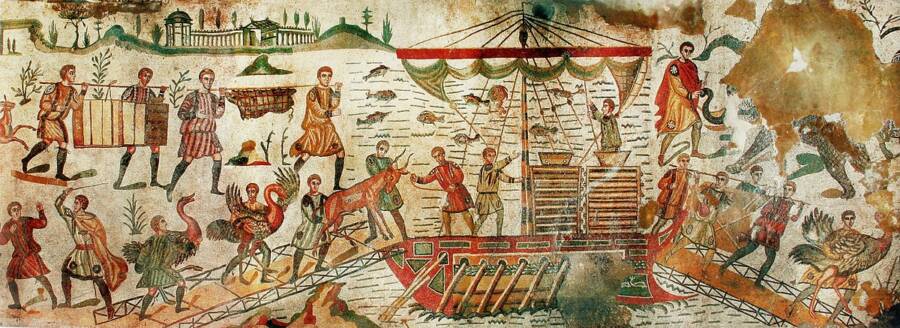Located in the thermal baths of the Villa Romana del Casale in Piazza Armerina, this mosaic was preserved almost completely intact after being covered in mud by an ancient flood.

Regione Siciliana/Parco Archeologico di Morgantina e Villa Romana del CasaleDating back to the fourth century C.E., the mosaic was uncovered in the southern baths of the villa.
An ancient mosaic depicting a pair of Roman sandals, similar to modern flip-flops, was revealed during a recent excavation at the Villa Romana del Casale in Sicily.
This find is the latest in an array of artwork that has been uncovered at the site, which includes a depiction of several young women wearing bandeau tops and bikini bottoms that’s been dubbed the “Bikini Girls” mosaic. Another famous mosaic from the site features exotic animals being hunted.
Along with the newly-discovered sandals mosaic, archaeologists also just found three columns and their respective capitals. These finds were made with help from students as part of the University of Bologna’s ArchLabs Summer School initiative.
The Discovery Of The Ancient Roman Sandals Mosaic At Sicily’s Villa Romana Del Casale

Wikimedia CommonsBuilt in the early fourth century C.E., the Villa Romana del Casale contains some of the most famous mosaics from the days of ancient Rome.
The flip-flops mosaic was discovered in the southern baths of the Villa Romana del Casale in Piazza Armerina, according to a statement from the Parco Archeologico di Morgantina. It was located near other mosaics, including one piece featuring white writing on a red background (what was written is unclear).
The surrounding room was further decorated with colorful tiles, including the bathing pool itself, which had a band of mosaic tiles lining the top. However, the mosaic of the sandals was particularly notable for its detailed craftsmanship.
Both the sandals and the nearby inscription were small parts of a larger work, which clearly required great time and care to put together. The mosaics were likely created by a highly-skilled artist in the 4th century C.E., roughly 150 years before the fall of Rome.
The mosaic was uncovered thanks to the ArchLabs Summer School project, a field school bringing together 40 students from 11 different countries. The program is a collaboration between Parco Archeologico di Morgantina e Villa Romana del Casale, Università di Bologna, and the Consiglio Nazionale delle Ricerche.

Wikimedia CommonsOne of the most famous pieces of art at the villa is known as the “Bikini Girls” mosaic.
Now, this sandal mosaic has joined a plethora of other works that have been found at the site. Perhaps the most famous piece of art that has been uncovered at the villa is the “Bikini Girls” mosaic, a work featuring nine women playing sports and wearing what appear to be bandeau tops and bikini bottoms.
Another famous piece from the villa is the “Great Hunt,” which depicts hunters catching numerous animals and moving them onto a ship for transport. All of these mosaics stayed well preserved thanks to an ancient flood that covered them in layers of mud, keeping them safe over the centuries.
The Prevalence Of Sandals In The Mosaics Of Ancient Rome

Wikimedia CommonsAnother famous mosaic from the site shows animals being hunted and transported.
The find was notable for the sandals’ resemblance to modern footwear, however this isn’t the first time that archaeologists have found mosaics from the days of ancient Rome that depict modern-looking flip-flops. It’s hardly unprecedented for archaeologists to find mosaics of sandals similar to this one in other Roman bath houses.
In fact, sandals were a common motif for mosaics in baths like the one at the Villa Romana del Casale. That’s because, as people do today in public showers or locker rooms, ancient Romans wore flip-flop-like sandals at bath houses.
Other mosaics of sandals have been found across the former Roman world. A bathhouse in Timgad, Algeria features a mosaic of Roman sandals with the inscription “bene lava,” meaning “wash well.”
Another sandal mosaic can be seen at the Sabratha Museum in Libya. This particular mosaic shows a pair of sandals, two strigils (which were common hygiene tools at the time), and an oil vessel alongside the words “Salvom Lavisse,” meaning “It is healthy to have bathed.”
The sandal mosaic and the other works recently discovered at the Villa Romana del Casale will now be cleaned and prepared for permanent exhibition. Archaeologists are also working on putting the data collected from the discoveries into a form of 3D documentation of this historic site and its many ancient wonders.
After reading about this newly-uncovered flip-flops mosaic, see the mosaic featuring aquatic animals discovered in an ancient bathhouse. Then, learn about the stunning marble floor of an ancient Roman villa found off the southern coast of Italy.





